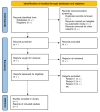Factors Influencing Domestic Human Trafficking in Africa: Protocol for a Scoping Review
- PMID: 39556420
- PMCID: PMC11612573
- DOI: 10.2196/56392
Factors Influencing Domestic Human Trafficking in Africa: Protocol for a Scoping Review
Abstract
Background: Human trafficking is a human rights violation in every region of the world. The African continent is not spared. Every year, millions of people experience significant health and social consequences. International organizations and governments combating human trafficking are hindered by a lack of knowledge about what factors influence domestic (within-country) human trafficking.
Objective: This study aims to conduct a scoping review to collate and synthesize literature on factors influencing domestic trafficking in Africa.
Methods: We will follow Arksey and O'Malley's framework to answer the question about reported influences on domestic human trafficking and their relative weight. The search strategy will explore PubMed, CINAHL, Web of Science, and Scopus. A total of 2 independent researchers will select quantitative, qualitative, or mixed methods studies that examine relationships influencing domestic human trafficking. We will document our results by following the PRISMA-ScR (Preferred Reporting Items for Systematic Reviews and Meta-Analyses extension for Scoping Reviews) guidelines. We will extract a list of all reported relationships between identified factors influencing domestic human trafficking in each study. Based on a discourse analysis approach, we will weigh the strengths of the relationships based on how frequently they are reported across the included studies. We will summarize the findings as fuzzy cognitive maps depicting the relationships reported in the literature. The maps represent the influences between concepts (nodes) linked by arrows (edges) going from each cause to its outcomes. These maps are helpful visual summaries of the factors associated with domestic human trafficking, allowing a comparison with maps to be created by stakeholder groups.
Results: This project received financial support in March 2023. We expect to start the project in March 2024. We recruited 2 research staff members to conduct the scoping review and expect to publish the results in March 2025.
Conclusions: The review will provide a comprehensive understanding of factors influencing domestic human trafficking in Africa. The overlap of human trafficking with other forms of exploitation, the limited literature on domestic human trafficking, and the likely diversity of factors are challenges for the review. We propose strategies to address these challenges.
International registered report identifier (irrid): PRR1-10.2196/56392.
Keywords: Africa; discourse analysis; domestic human trafficking; exploitation; fuzzy cognitive map; human rights violation; human trafficking; modern slavery; protocol; scoping review protocol; trafficking.
©Loubna Belaid, Ivan Sarmiento, Anna Dion, Andrés Rojas Cardenas, Anne Cockcroft, Neil Andersson. Originally published in JMIR Research Protocols (https://www.researchprotocols.org), 18.11.2024.
Conflict of interest statement
Conflicts of Interest: None declared.
Figures


References
-
- Global Slavery Index: modern slavery. Walk Free. 2021. [2023-11-02]. https://www.walkfree.org/global-slavery-index/findings/global-findings/
-
- Global Slavery Index: modern slavery in Africa. Walk Free. 2021. [2023-11-02]. https://www.walkfree.org/global-slavery-index/findings/regional-findings...
-
- Policy issues: Human trafficking. U.S. Department of State. 2017. [2024-09-24]. https://www.state.gov/policy-issues/human-trafficking/
-
- Bryant K, Landman T. Combatting human trafficking since Palermo: what do we know about what works? Journal of Human Trafficking. 2020;6(2):119–140. doi: 10.1080/23322705.2020.1690097. - DOI
-
- Protocol to prevent, suppress and punish trafficking in persons especially women and children, supplementing the United Nations convention against transnational organized crime. United Nations, Office of the High Commissioner for Human Rights. [2024-04-04]. https://www.ohchr.org/en/instruments-mechanisms/instruments/protocol-pre... .
MeSH terms
LinkOut - more resources
Full Text Sources
Miscellaneous

